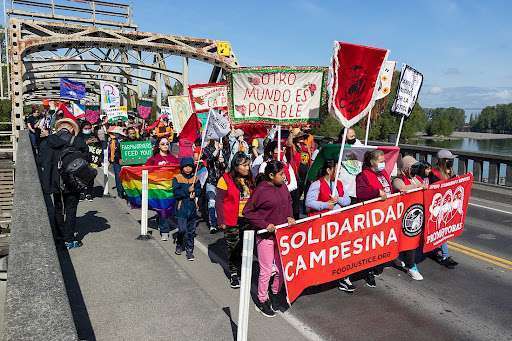“Earth Day to May Day” Marcha Campesina, Skagit County, WA. Photo credit: David Bacon
Happy Earth Day!
Started in 1970, the original Earth Day is often credited to Wisconsin Governor/Senator Gaylord Nelson, but there is actually a lot more grassroots action behind this story. Spurred by the warnings of Silent Spring and 1969 catastrophes such as the Santa Barbara offshore oil spill and the Cuyahoga River catching fire, the young environmental movement organized a national day of campus teach-ins, mass demonstrations, and public school activities such as tree planting and beach cleanup. An estimated 20 million people participated. Given the tenor of the counterculture and anti-war movement at that time, a protest that focused on affirmative, solution-oriented actions was widely embraced by all – a little known fact is that the United Auto Workers (UAW) were the single largest financial supporter of the first Earth Day.
Earth Day actions led to the creation of the EPA, Clean Air Act and Clean Water Act. Over 50 years the idea has spread to nearly every country in the world. But now, it has mostly lost the fierce and urgent edge that it once had. If you attended Earth Day events over the weekend, you likely saw a pavilion with Exxon plastered on it or a stage sponsored by Chevron. Every channel shows ads implying that “BP” stands for “Beyond Petroleum” (to that we say: “BS”). Corporate co-optation and disinformation have neutered and ruined Earth Day, to the point where many in the environmental justice movement ignore it.
But EJ needs to reclaim Earth Day, to make it once again a day of protest, to exceed its inoffensive image by engaging in direct action and demanding the necessary policy changes and redistribution of resources to the grassroots communities and local economies that are fighting to protect their lived environments while also building real solutions from the bottom up.
Next week we will celebrate another holiday that is very important to our movements. May Day has a much longer history, and over the centuries it has become complex and multi-faceted. Originally a fertility ritual rooted in pre-Christian European cultures, May Day was a signal of the beginning of the planting season, and therefore it is inherently “green.” In the 1880’s it gained its “red” aspect after May 1st was declared an international day of demonstration for all workers to demand respect and dignity, and it became firmly entrenched in the early labor movement as a commemoration of the Haymarket martyrs. Ironically, International Workers’ Day has been pretty effectively suppressed in the United States where it originated, but it is a cherished reprieve from work and a vibrant day of action in many other countries. Beginning in 2006, May Day became also “brown” after immigrant workers, mostly Latino and many undocumented, organized marches all over the US declaring that they were unafraid and demanding the human rights they deserved. To this day, our comrades at Familias Unidas por la Justicia organize an annual Marcha Campesina to call attention to farmworkers’ rights.
This “green/red/brown” vision of May Day is so important to us at the Just Transition Alliance. It vibes perfectly with our history and our perspective. We seek to bring together Labor and EJ movements, to center the voices of those on the frontlines and fencelines of production, and to build grassroots power as we restore health to the workers and families who keep our economies running, repair relationships with our neighbors and comrades in struggle, and regenerate thriving ecosystems in the places we call home.
Let’s make “Earth Day to May Day” a continuous ten-day festival. A festival of action and organizing to make a better world possible. A festival of resistance where we raise our voices, not allowing anyone to go on complacently accepting business as usual, where we demonstrate our visions by celebrating our grassroots solutions, and where we recognize our strength by joining together from many perspectives to become unified in our shared need to transcend beyond colonization, extractivism, and oppression.

